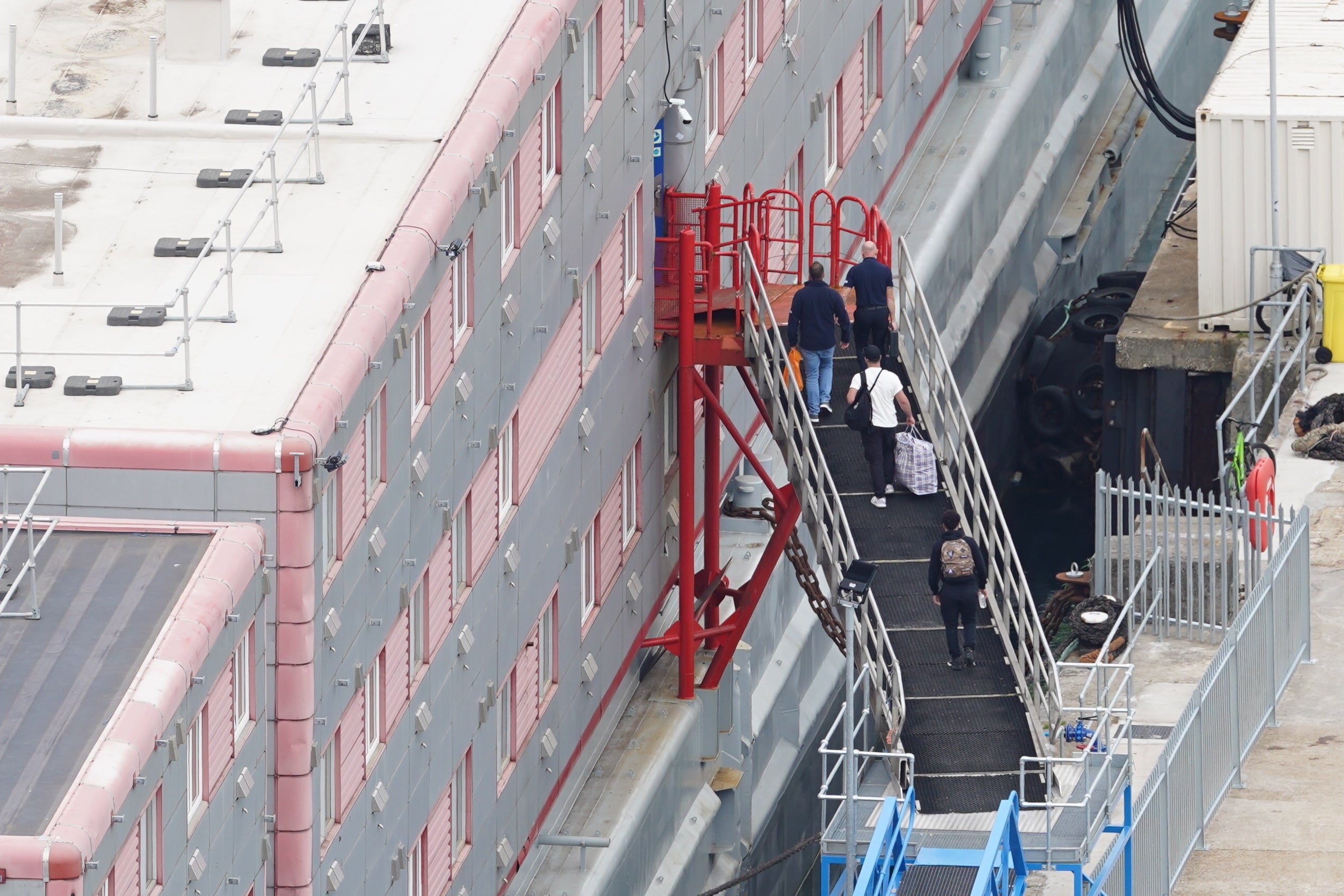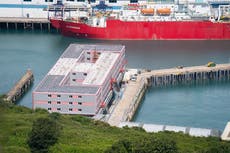Bibby Stockholm: Home Office breaks rules trying to put disabled asylum seekers and torture victims on barge
At least 20 transfer orders reversed after legal letters, as charity triggers wider challenge against barge
Disabled asylum seekers, torture victims and migrants who have suffered “traumatic experiences at sea” are among those that the Home Office has attempted to put on board the Bibby Stockholm – in violation of its own rules.
The Independent understands that a man who is blind in one eye, another partially-sighted person, and migrants with phobias of water were issued with transfer orders that were successfully challenged by lawyers.
The department has so far been forced to reverse decisions to move at least 20 people and is now facing a wider challenge against the Bibby Stockholm.
Steve Smith, chief executive of refugee charity Care4Calais, said all of the asylum seekers it was supporting had their transfers to the barge “cancelled” after lawyers wrote to the Home Office.
“Amongst our clients are people who are disabled, who have survived torture and modern slavery and who have had traumatic experiences at sea,” he added.
“To house any human being in a ‘quasi-floating prison’ like the Bibby Stockholm is inhumane. To try and do so with this group of people is unbelievably cruel.”
A small group of 15 migrants, each with standard-issue backpacks, arrived on Monday, following delays caused by last-minute safety checks, and the government is not believed to have identified all 500 people it eventually hopes to house on board.
The charity Migrants Organise has sent a pre-action letter to the Home Office calling for it to stop transfers “until and unless all concerns regarding the safety and suitability of the barge have been adequately addressed, including the necessary fire safety checks”.
The letter, sent on Sunday, demanded a new screening process for asylum seekers selected for the barge, and a minimum of 72 hours’ notice of transfer.
It warned of “serious risks” of unlawful detention, targeting by far-right groups, virus outbreaks, fire, overcrowding and a lack of privacy.
Rules imposed by the government itself exclude categories of vulnerable people from the barge, where they will be housed in tiny cabins stuffed with bunk beds, but charities believe many asylum seekers issued with transfer notices have not received advice or support.

Brian Dikoff, legal organiser at Migrants Organise, said: “The Bibby Stockholm is not safe and no amount of repurposing can make it so.
“It will never be an appropriate place to put people who are seeking safety here to rebuild their lives.”
The Independent understands that the Home Office intends to only house people on the barge for between three and nine months.
Asylum seekers who arrived in the UK before March are being moved on board from hotels, rather than directly from processing centres near Dover, and if their claims are not decided in the period they may be sent back to hotels.
Internal guidance states that only single men between the ages of 18 and 65 can be put on the Bibby Stockholm, and that they cannot be victims of modern slavery or trafficking.
They cannot be disabled, elderly, or victims of torture, rape or other serious forms of psychological, physical or sexual violence.
Those with “complex health needs”, such as tuberculosis and infectious diseases, are also excluded, as is anyone with serious mental health issues.

The Home Office bars anyone who is at risk of suicide or “serious self-harm”, or who has a “history of disruptive behaviour”.
Official letters to selected asylum seekers said there will be access to an on-site nurse, “recreational space”, English classes, “voluntary sector activities” and “entertainment areas”, as well as a worship room and private space for legal consultations and phone calls.
The vessel contains 222 cabins lining narrow corridors over three decks, with at least one bunk bed crammed into every room to increase the capacity to around 500.
In the latest blunder, Home Office minister Sarah Dines appeared to suggest the full capacity could be reached by the end of this week, telling BBC Radio 4’s Today programme: “Quite possibly it will be 500 [this week]. We are hoping.”
But when asked about the comments, the prime minister’s official spokesperson, said: “We are looking to [reach] that number over time — I don’t think we are aiming to do it by the weekend.”

Even if it reaches its full capacity, the Bibby Stockholm will house under 1 per cent of in excess of 50,000 asylum seekers who are currently accommodated in hotels at a cost of over £6m a day.
It was initially one of several vessels the government hoped to use as asylum accommodation, but ministers have not yet found any other ports willing to host them.
They are part of a wider drive for “alternative accommodation sites”, including disused military bases and a former prison, that the government claims will be cheaper than hotels.
There have also been delays and legal challenges to the use of RAF Scampton in Lincolnshire, while some of the first asylum seekers moved to RAF Wethersfield in Essex in July were diagnosed with scabies and tuberculosis.
The recently passed Illegal Migration Act puts a legal duty on the home secretary to detain and deport small boat migrants, but there are no operational asylum transfer agreements following the Court of Appeal’s ruling that the Rwanda deal was unlawful.
Reports suggest that ministers could be looking at alternative destinations, and reviving previously dropped plans to send asylum claimants to Ascension Island, an isolated British Overseas Territory in the South Atlantic.
Successive governments have claimed such measures would “deter” English Channel crossings but numbers remain high, with more than 15,000 people making the crossing so far this year despite weeks of unseasonably rough weather.
Join our commenting forum
Join thought-provoking conversations, follow other Independent readers and see their replies
Comments


Bookmark popover
Removed from bookmarks